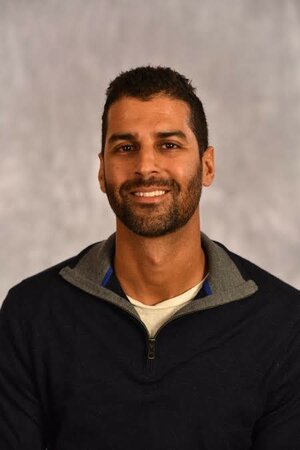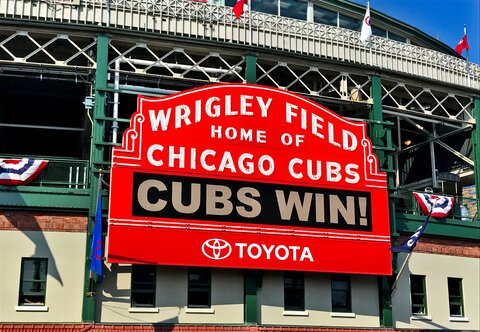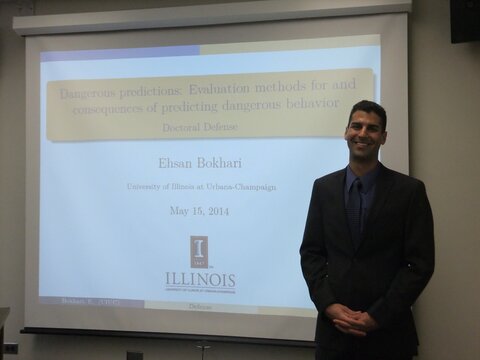University of Illinois Urbana-Champaign alumnus, Ehsan Bokhari, was recently named the new Assistant General Manager for the Chicago Cubs. The 38-year-old Bokhari graduated from Illinois in 2011 with a Masters in Statistics and in 2014 with a Doctorate in Quantitative Psychology. Bokhari served as a visiting assistant professor in the Department of Statistics before heading off for the major leagues in 2015 to work with the Los Angeles Dodgers as a senior analyst in research and development. In 2018, Bokhari would move from the Dodgers to the Houston Astros as Director of Research and Development.
Shortly after being named the Assistant General Manager of the Chicago Cubs in October of 2021, Bokhari was generous enough to take some time for an interview with the Department of Statistics.
At eight-years-old, Bokhari would get to see his first Major League Baseball game while visiting San Diego, California. It would be this game that Bokhari would get to see his favorite team, the Chicago Cubs, come play the San Diego Padres at the old Jack Murphy Stadium. So it is rather serendipitous that almost thirty years later, Bokhari would be called up to the Chicago Cubs to help lead them into the future. Even with a walk-up song picked out (yes, we asked), Bokhari may not be playing the traditional game of baseball when one thinks of America’s pastime, but he is playing it a new way in a data-driven world. And for the new Assistant General Manager of the Chicago Cubs and Illinois alumnus, it is time to get to work.
From the Dodgers, to the Astros, and now the Cubs, you've been linked to some impressive teams. What drew you or inspired you to pursue a career in the MLB?
I had a strong passion for baseball growing up---I was a big fan of the game. My interest around baseball analytics, or sabermetrics, started early in my undergraduate days through fantasy baseball but developed into something more meaningful my senior year when I started applying what I was learning in school to publicly available baseball data and that continued through graduate school. But as my graduate tenure was coming to an end, I wasn’t pursuing opportunities in baseball---it didn’t seem realistic. And I went a different route and took a position at Illinois in the department of statistics as a visiting assistant professor. I was pursuing tenure-track academic positions during my time in the department of statistics but when I came across the position with the Los Angeles Dodgers on TeamWorkOnline (a great resource for sports careers, by the way), it actually did seem like a realistic possibility (in large part because my wife really pushed and encouraged me to go for it). So I gave it a shot and within a week heard from the Dodgers’ director of R&D at the time, Doug Fearing. When I got the email from him, I was so excited I gave up all other jobs I was pursuing. A couple of months later, Doug hired me as a senior analyst. I was part of his original R&D department in 2015 that included eight other people. By the time I left in 2018, Doug had built that team to almost 20, including 7 PhDs (Doug, himself included in that count). It was, and still is, an incredible group of talented and amazing individuals.
Can you explain a little on what a research and development analyst and senior analyst for strategic decision-making brings to the table for these world-class teams?
R&D provides systematic approaches for decision making through research, advanced metrics and models, and development of tools via software applications. An analyst in R&D is the one who is building out those models and metrics. In Los Angeles, I worked on a number of projects but most notably would be the models used to evaluate each and every pitch thrown in professional baseball, more than a million a season across the major and minor leagues. In Houston, I held three different roles. The first was leading the Research and Development team which I was hired to do at the end of the 2018 season. The Astros’ R&D team is one of the best in baseball and consisted of analysts, software developers, and a biomechanist. The Astros are one of the more innovative teams and that comes from an incredible amount of buy-in within the organization from the bottom-up; coaches, scouts, players all have an incredible appetite for information. That makes R&D immensely important because much of that information is coming from or through R&D. It’s important that it’s very clear what information data/models provide---and more importantly---do not provide and that everyone is on the same page in terms of what metrics mean. At the end of 2019, I moved into a department we called player evaluation where I oversaw our scouting processes in the three markets: pro, amateur, and international. One of the things that I think made the Astros great was putting people in unorthodox roles (in my case, me being someone coming from R&D now leading scouting) and allowing them to create a vision that may be untraditional and learn through failure. My role was to oversee the processes for collecting information and then bringing that information together to make well-informed decisions. This means that our scouting groups are aligned in terms of data collection and measurement. The latter is particularly important, and we really emphasized transparency among the group. We wanted to ensure that it was unambiguous as to what information/data we were asking to be collected. The last thing you want is to waste the skills of our scouts because we have ill-defined objectives. If you have a dozen scouts providing information and each one believes the definition of what they are grading to be different then you have a big problem. Scouts have a difficult job and anything we can do to make it easier and provide more powerful data for making decisions is good for everyone. It was particularly important in 2020 where we had a five-round draft and had lost our first and second round picks. Finally, my last year with Houston I created a department that I called strategic decision making. I took what I was doing with scouting and applied it to the entirety of baseball operations. This role and department were built to establish long-term success in the organization by staying on top of innovation, ensuring that everyone was fully educated on what the organization is doing, and establishing sound, consistent, and systematic processes for decision making.
Given your skillset and background, what do you hope to accomplish with the Cubs organization in your new position?
I plan to bring a data-driven mindset to everything we do. Data come in all shapes and forms which includes opinions from scouts and coaches. The important part is that we are accepting of all forms of information and work to establish the best way of collating that data to make the best decisions for the organization.
Getting an MS and PhD from UIUC, as well as serve as a visiting professor of statistics, you obviously spent quite a bit of time on campus, what was your experience like and/or fondest memories of campus?
My fondest memories come from teaching. I spent five of my ten semesters as a teaching assistant and then a year in the visiting assistant professor position. I love teaching and being a conduit for knowledge. It was something that I was developing at, and I really enjoyed how much I learned about myself through teaching. In undergrad, I did a lot of tutoring; I worked at a tutoring center (where I met my wife!), tutored privately, and tutored at a couple of local high schools. But I was not sure how much I would enjoy teaching when I entered graduate school because what I loved about tutoring was the one-on-one aspect. But it was by far my favorite part about graduate school.
Statistics/Analytics on a whole is a valuable resource for any organization and with Illinois providing the necessary training for individuals such as yourself, what advice would you give to students looking to pursue a career in professional sports analytics?
Seek out opportunities where and when you can. There are many ways of doing this and sometimes it means creating your own. This could be through internships with teams or companies working with baseball teams which is the more direct route but it can also be through the Illini Sports Analytics club, attend conferences (SABR Analytics or Saberseminar are the best baseball ones), finding professors on campus that have done work or are interested in baseball analytics, working with one of the university’s athletic programs, or doing your own independent work and trying to get it published (for example, in a journal or blog). My own experience was limited to the last example, but it was work that I did in my coursework---mostly end of semester projects---that I was able to present to the Dodgers in a “job talk” when I interviewed. Reach out to people in the industry and ask them about their experiences, how they got into baseball, what it's been like working in baseball.
And finally, what are you listening to as your walk-up song (music that typically plays as a batter steps up to the plate)?
Ha, great question! My walk-up song would be Triumph, from Wu-Tang.
Aaron Thompson
2021-11-29


